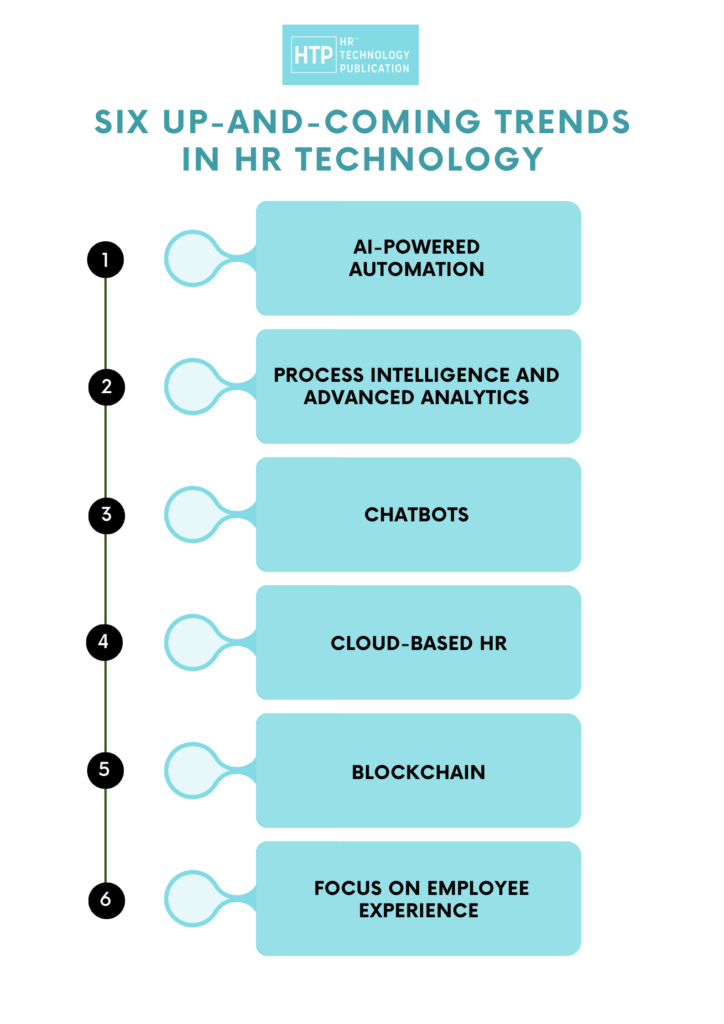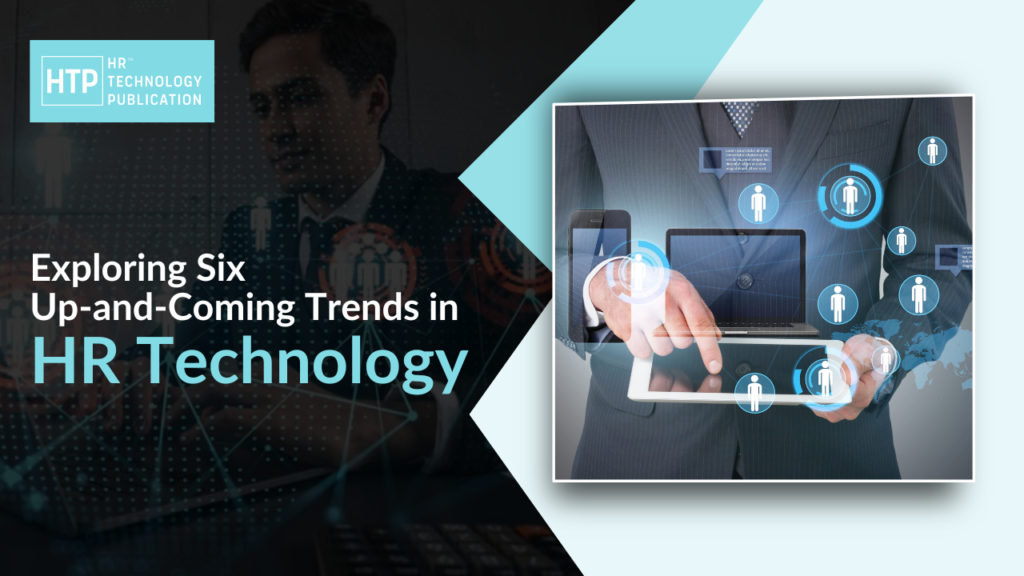In the ever-evolving landscape of work, businesses must stay ahead of trends to attract and retain talent. The “Great Resignation” has reshaped the employment landscape, emphasizing the need for innovative HR technology solutions.
Here are six key HR tech trends shaping the future:

1:- AI-powered Automation:
In the landscape of HR evolution, AI-powered automation emerges as the vanguard, fundamentally reshaping the paradigms of talent acquisition and retention. Intelligent bots, equipped with cutting-edge capabilities, intricately weave through the intricate tapestry of recruitment processes. They transcend mere resume screening, extending their prowess to encompass comprehensive candidate guidance. This transformative influence permeates every facet of HR functionality, orchestrating a symphony of optimization in onboarding, performance management, payroll processing, and offboarding.
2. Process Intelligence and Advanced Analytics:
In the dynamic landscape of HR evolution, the utilization of machine learning unfolds as a transformative force. It empowers HR professionals with an extensive toolkit, facilitating a nuanced understanding of performance metrics and prevailing trends. The integration of process mining and digital twins into HR strategies brings forth a new era of real-time visibility. These advanced analytics not only illuminate operational workflows but also meticulously identify bottlenecks. This granular level of insight serves as the foundation for strategic decision-making, laying the groundwork for operational excellence.
3. Chatbots:
These advanced chatbots are not mere automaton responders; they are sophisticated tools designed to handle intricate responsibilities. From the intricacies of scheduling, and responding to frequently asked questions (FAQs), to processing leave requests, chatbots exhibit finesse and efficiency. By taking charge of these repetitive yet critical tasks, they effectively free up HR professionals, allowing them to redirect their focus toward more strategic, high-value initiatives.
The true power of chatbots lies in their ability to transform the HR landscape from a reactive to a proactive domain. Liberated from the shackles of mundane tasks, HR professionals can now concentrate on initiatives that contribute directly to organizational growth and employee satisfaction. This newfound freedom enables HR teams to foster proactive engagement strategies, ensuring that employees experience a personalized and enriching journey within the company.
4. Cloud-based HR:
The transition to cloud HR represents a fundamental redefinition of accessibility and flexibility. By affording remote access to critical HR information, attendance tracking, and nuanced productivity metrics, these innovative systems transcend geographical constraints. This not only facilitates a more distributed and diverse workforce but also lays the groundwork for a future-proofed organizational structure capable of navigating the complexities of contemporary work environments.
At its core, cloud-based HR is a catalyst for agility and resilience. The dynamic nature of today’s work scenarios demands adaptable solutions, and cloud HR systems deliver precisely that. They act as pillars of continuity, ensuring uninterrupted HR operations even in the face of unexpected disruptions or transformative changes. Collaboration, a cornerstone of modern work, is amplified as cloud HR fosters a cohesive and interconnected digital workplace.
Moreover, the collaborative potential extends beyond geographical boundaries. Cloud-based HR facilitates real-time collaboration and information sharing, knitting together a cohesive organizational fabric irrespective of physical locations. This not only enhances operational efficiency but also nurtures a sense of shared purpose and community among team members.
5. Blockchain:
It’s not only about cryptocurrency it is also about crypto data, blockchain serves as a safeguard for the authenticity of credentials, instilling a heightened level of integrity in HR processes. Its decentralized and immutable nature ensures that once information is recorded, it remains unalterable, providing a secure and tamper-resistant repository for critical data.
A noteworthy exemplar of blockchain’s potential lies in the initiatives undertaken by esteemed institutions like MIT, which pioneers the issuance of blockchain-based diplomas. This not only expedites the often cumbersome process of background verification but also introduces a paradigm shift in how academic and professional achievements are validated.
In essence, blockchain technology becomes a guardian of trust, revolutionizing the landscape of HR practices. By mitigating concerns related to fraudulent credentials and ensuring swift, verifiable information, it lays the groundwork for a future where hiring processes are streamlined, efficient, and characterized by an unprecedented level of confidence.
6. Focus on Employee Experience:
At the core of this transformative approach lies a commitment to fostering a workplace culture that goes beyond traditional roles, emphasizing the individual’s growth, fulfillment, and overall experience within the organizational ecosystem. The infusion of Augmented Reality (AR) and Virtual Reality (VR) technologies emerges as a strategic lever, unlocking new dimensions of engagement and learning.
The integration of AR and VR represents more than a technological enhancement; it signifies a deliberate investment in creating a work environment that transcends the ordinary. By incorporating these technologies, organizations immerse employees in interactive and dynamic experiences, redefining how they perceive and engage with their professional journeys.
One pivotal aspect of this strategic focus is the enrichment of upskilling opportunities. AR and VR technologies provide platforms for immersive learning experiences, allowing employees to develop new skills in realistic and simulated environments. This not only aligns with the evolving demands of the digital age but also positions organizations as proactive facilitators of continuous learning and growth.
Conclusion
The integration of these trends empowers organizations to navigate the changing landscape, improve employee experiences, and foster resilience in the face of evolving work dynamics. As businesses embrace digital transformation, HR technology becomes a strategic enabler for success.
Stay informed on B2B tech trends with insights from our Principal Analyst, Cem Dilmegani, who has a wealth of experience advising businesses on enterprise software, automation, cloud, AI/ML, and technology-related decisions.



